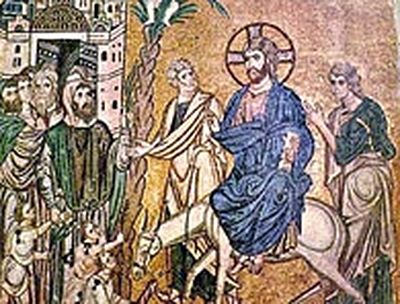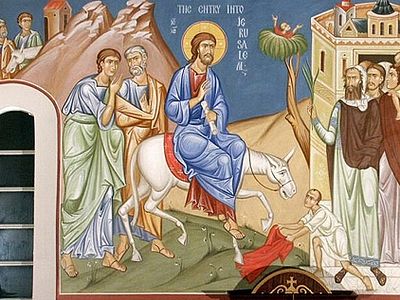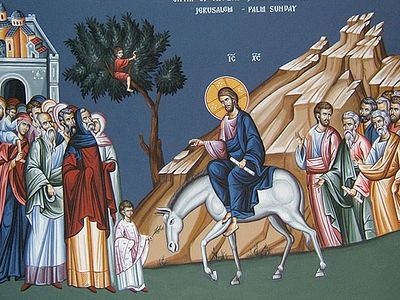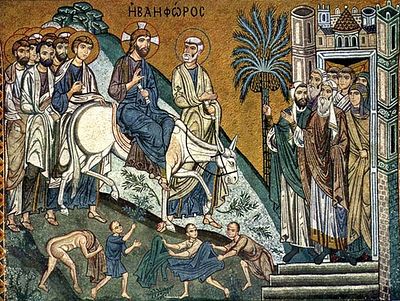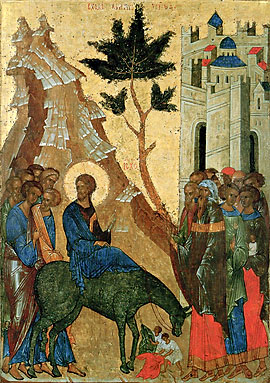
Today we commemorate our Lord’s entry into Jerusalem; an entrance that looks to be a triumphant entry, like an entry of a King into a conquered city. “Hosanna!” chants the crowds excitedly, “Blessed is he who comes in the name of the Lord, even the King of Israel.” The crowds are out in force, proclaiming Jesus to be the Messiah, celebrating his entrance into the Holy City. They are throwing their palm branches before him. There is great celebration.
But we know that a week later, the same crowd will call for his crucifixion, a dramatic turn around as the one who was proclaimed king and savior, is traded for a thief named Barabas and sentenced to death by crucifixion as a criminal. What happened in this span of less than a week? Why did the crowds who so recently declared him king turn on him and cry out for his death? I believe that the answer to these questions resides in the fact that the crowd did not really understand Jesus; they did not really know who he is.
Throughout his ministry, Jesus asked the question, “Who do you say that I am?” This is perhaps the most important question asked at any time in history. It is the question that Jesus poses not just to those who he met while he lived physically on earth, but it is the question that he poses to us this morning and every day of our lives. Who do you say that I am? Who do you say that I am?
It is an intimate question, one that is goes to the core of being. The question is not a casual, shallow question. In so many social situations, we are introduced to another person and inevitably the question is asked “What do you do?” And we answer the question with a quick, short response—“I am a teacher, I am a nurse, I am a lawyer, I am a doctor, I am a businessman, I am a homemaker”… as if this explanation offers a glimpse into who we are. We define ourselves to others by what our occupation is, but the answer is not intimate or really very informative. Why? Because we are not describing who we are at the core of our being. What we do for a living does not fully describe our soul, what we are about, what we love, our personality—it does not describe who we really are. Jesus asks us an intimate question, one that delves to the very core of being. By asking the question, “Who do you day that I am,” Jesus is really asking, “Do you really know me?”
Early in his ministry, John the Baptist sent one of his disciples to Jesus asking him if he was the messiah. Jesus did not directly answer John, rather he simply pointed to what he did: the blind see, the lepers are healed, the lame walk, the dead rise and the good news is preached. Rather than offering a straightforward answer, Jesus pointed to concrete evidence to make a statement about who he is. John was to come to his own conclusion to his question, “Who is Jesus?” Jesus throws the question back to John to consider. Given what you’ve seen me do and say, what am I about, who do you think I am?
Towards the end of his ministry, Jesus asked his disciples, “Who do the people say that I am?” The disciples responded: “Elijah returned, Jeremiah, a prophet.” Perhaps dissatisfied, Jesus poses the same question to his disciples, “Who do you say that I am?” Peter, ever the eager one, proclaims, “You are the Christ, the Son of the living God.” Jesus tells Peter that this was known by the grace of the Holy Spirit. By affirming Peter’s answer as from the Spirit, Jesus is telling us the conclusion we all must reach to really begin to know him.
But now we fast-forward back to Christ’s entrance into Jerusalem. The people were expecting a Messiah or a Christ. But their understanding of the Messiah was too limited. The crowds were expecting a savior who would give them a temporal victory. They were expecting a leader who would lead them to freedom over their Roman oppressors. They were expecting a political savior.
The crowds didn’t really understand Jesus, they didn’t really know him. They were desiring a Messiah of their own making, their own creation. Once they discovered that Jesus was not going to fulfill their expectations, they quickly deserted him in the harshest of ways—they handed him over to death on the cross.
Quite often today, people believe in a Jesus of their own making. Some reduce Jesus to a good teacher, one who taught about love and morals. Others see him as a pacifist. Some cast Jesus as a spiritual guru who, like Buddha, will help us reach spiritual enlightenment. Others envision Jesus to be a social activist—one who challenged the status quo and broke social barriers. Others cast Jesus as a sort of spiritual teddy bear—a wishy-washy friend to forgives all and demands nothing.
All of these ideas of Jesus have an element of truth in them, but all fall short of portraying an accurate picture of who Jesus really is. He is a good teacher. He is a peace maker. He is the Truth and therefore is the one who leads us to real enlightenment. He is one who challenges the status quo, who offers justice to the oppressed, and challenges our conventional wisdom. He is our friend and the one who forgives all our iniquities. And yet he is so much more.
To some degree, Jesus defies our attempts to define him. He refuses to let us put him in a box. To those who see him as only a good teacher, he refutes their conception by laying claim to authority that only God himself has—thus proclaiming his divinity. To those who see him as a pacifist, he confounds by saying, “Do not suppose that I have come to bring peace to the earth. I did not come to bring peace, but a sword.” To those who see him as another Buddha, as just another way to enlightenment, he says, “I am the way and the truth and the life. No one comes to the Father except through me.” For those see him as one who grants forgiveness without demanding any change within us, he preaches judgment. He is all of these things to some degree, but he cannot be reduced to any of them. To reduce Jesus down to a creature of our own making is to deny who he really is, and it is just as if we were apart of the crowds yelling, “crucify him, crucify him!” We have no use for the real person.
Jesus, therefore, is truly an enigma; he is beyond our
simple definitions. Even the great Fathers of the Church
and the Great Councils of the Church struggled as to how
to answer this question. They understood that Christ was
divine and human, but they struggled over how to put him
into words. They often chose to leave things unsaid,
rather than overstating any particular element. The
fathers struggled because they knew that what was said
about Jesus must be fully balanced and true to his entire
person, his very being. Leaning too far towards his
humanity or his divinity would lead down the dark raod of
heresy and misunderstanding, just as many modern notions
of Christ do. Jesus defies simple definitions, simple
reductions.
And yet he calls to us, challenging us, “Who do you
say that I am?” He calls us into fellowship with
him, he calls us to intimacy. He challenges us to allow
him to alter our preconceived notions of who he is. The
crowds thought they knew who Jesus was, and when they saw
that he wasn’t what they wanted and expected, they
turned on him and crucified him. The crowds did not want
their notions challenged by the authentic Messiah. Today
we must decide, will we allow our own preconceived notions
to be challenged by him?
The Lord of creation, the one who walked with Adam and Eve in the Garden, the one who raised Lazarus from the dead, the one died on the cross for the sins of the world and rose again three days later calls to us. The bridegroom calls out to his church and to the world this morning, simply asking, “Who do you say that I am?”
Amen.
Given by Deacon Kevin at



